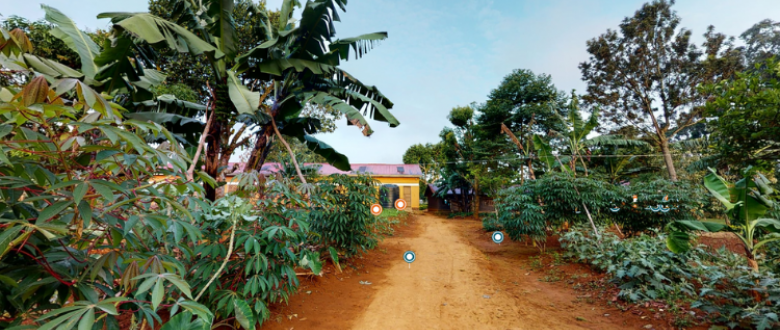
During the Covid-19 pandemic, schools were forced to close. At the National Instructors’ College Abilonino (NICA), teacher trainers were eager to find solutions: "How can we introduce our student teachers to the diversity of the world of work with these travel restrictions? And how can we introduce them to internship opportunities at various agribusinesses all over Uganda remotely?"
Visiting the world of work through virtual tours
Under the Teaching Agriculture Practically Programme (TAP), Maarifasasa and VVOB in Uganda experimented with the pedagogic opportunities of virtual interactive tours as a solution to create the opportunity for student teachers to go on virtual study trips and get to know the world of work via (remote) classroom settings.
In rural and low-income areas, where teaching infrastructure, equipment, and supplies are not always a given, the delivery of quality and practice-oriented TVET courses in agriculture is challenging, negatively impacting future job opportunities.
However, with the appropriate teaching method, virtual tours have proven to be effective for vocational training, allowing for:
- Simulation of farm (management) activities
- Demonstration of technical skills needed on-the-job
- Use of case studies as input for debate
- Use of educational gamification like quizzes and puzzles.
Bob Okello, CEO of Maarifasasa describes the benefits of the virtual visits: " 3D panoramic visits can be viewed on any screen-based device such as laptops, tablets, and smartphones, unlike immersive virtual reality visits that require VR headsets, often not easily accessible for most users. Given the context and reality of most intended users of the virtual visits, the 3D panoramic virtual tours were the best alternative for accessibility and ease of use."
Making the most of work-based learning
Over a period of six weeks per year of study, student teachers from the National Instructors’ College of Abilonino work in host enterprises in the agricultural sector. This internship is called industrial training (IT). IT is a form of work-based learning (WBL) integrated in the PRESET curriculum, with the purpose of strengthening future teachers’ technical and entrepreneurial competences in their selected professional discipline.
During this period, NICA students typically look for IT opportunities in the agricultural sector in their proximity. Often, this search takes them to (small) agri-enterprises with which they have existing (family) relations. While crucial to building teachers’ dual professional identity, the IT period remains underutilised because of a lack of clarity on the learning objectives, host enterprises often assigning routine tasks to student teachers, and insufficient support-supervision from both NICA and the workplace supervisor. As NICA students search for IT opportunities, this period can also be used to explore surrounding agri-entrepreneurship ecosystem.
Jim Wasilwa, agricultural lecturer at NICA, highlights how virtual tours helped teacher students in finding industrial training opportunities: “Virtual visits were intended to improve of the process of finding IT placements, since most students were searching for their own places. Besides that, the objective was to bring IT host premises close to students if they could not reach them. The cost of student placement was also minimised by reducing teacher trainers’ movements. The virtual solution also made it possible to have a variety of IT hosts for students, such that they could make proper choices and selection. It exposed students to some IT hosts that were far away, such that the learners could learn from them.”
Researchers emphasise that, in order to be effective, internships need to meet a number of criteria, such as clear learning objectives, quality content, strong and coordinated preparation, guidance (or "support-supervision" as it is called in Uganda) and assessment of students before and during the placement (JJuuko et al., 2021; Mikkonen et al., 2017).
Interested to go on a virtual study trip in Uganda?
Ankole Coffee Producers Cooperative Union – West Uganda
Organic and Fairtrade processing factory of coffee beans
Small-holders agro-ecological and innovative farmers cooperation
Ssese Agricultural Farm Institute – Ssese Island Uganda
Innovative and diverse farm with urban farming, apiary, horticulture and fish farming
Gulu Uganda Country Dairy – Northern Uganda
Family owned Gulu Dairy farm
Ngetta ZARDI – Northern Uganda
Government research center in Agriculture
Looking ahead
The expectation is that by offering this virtual experience, student teachers can articulate learning objectives for their industrial training and choose suitable host organisations for their internship. The experience is also a resource they can use in their own classrooms once they find employment as instructors in vocational training institutions. These virtual experiences contribute to a more practical approach to teaching agriculture and promote transversal themes such as gender equality and sustainability. Student teachers are encouraged to explore real-life company settings while learning proactively and autonomously in a playful and self-paced way.
Virtual tours are technological solutions in education that have a high potential to improve the quality of industrial training. Through virtual tours, NICA-lecturers support student teachers to set their learning objectives for internships in agribusinesses. The technology introduces them to a diversity of agri-businesses and opportunities in the country and showcases the different activities they can encounter in the world of work.
Due to the Covid-19 pandemic, there were no industrial training internships that took place in the past year. The development team is therefore looking forward to testing this solution in preparation of the next industrial training and to explore how these innovations support student teachers in developing relevant technical, digital, entrepreneurial and pedagogical competences.




